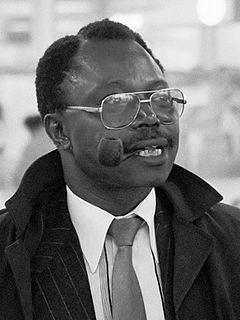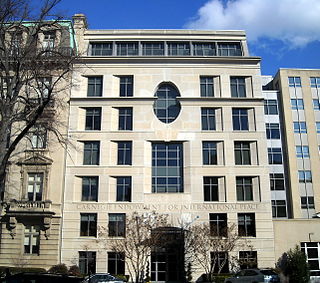Related Research Articles

A think tank, or policy institute, is a research institute that performs research and advocacy concerning topics such as social policy, political strategy, economics, military, technology, and culture. Most think tanks are non-governmental organizations, but some are semi-autonomous agencies within government or are associated with particular political parties, businesses or the military. Think-tank funding often includes a combination of donations from wealthy individuals and personal contributions, with many also accepting government grants.

Adebayo Adedeji was a Nigerian economist and academic. A full-fledged Professor at the age of 36 years, he was Nigeria's Federal Commissioner for Economic Development & Reconstruction from 1971 to 1975. He was responsible for the economic development and reconstruction of post-civil war Nigeria. In June 1975, he was appointed Executive Secretary of the United Nations Economic Commission for Africa and remained in this position until July 1991. Adedeji wrote the Lagos Plan of Action of 1980 that was adopted by the UN and OAU. On his return to Nigeria, he founded the African Centre for Development and Strategic Studies (ACDESS), a non-governmental independent continental non-profit, think-tank dedicated to multi-disciplinary and strategic studies on and for Africa. He received the national honor of Commander of the Federal Republic.

The Carnegie Endowment for International Peace (CEIP) is a nonpartisan international affairs think tank headquartered in Washington D.C. with operations in Europe, South and East Asia, and the Middle East as well as the United States. Founded in 1910 by Andrew Carnegie, the organization describes itself as being dedicated to advancing cooperation between countries, reducing global conflict, and promoting active international engagement by the United States and countries around the world.

The Centre for International Governance Innovation is an independent, non-partisan think tank on global governance. CIGI supports research, forms networks, advances policy debate and generates ideas for multilateral governance improvements. CIGI's interdisciplinary work includes collaboration with policy, business and academic communities around the world.

Atlas Network, formerly known as the Atlas Economic Research Foundation, is a non-governmental 501(c)(3) organization based in the United States that provides training, networking and grants for libertarian and free-market groups around the world. It partners with about 500 organizations in nearly 100 countries.
The Washington Institute for Near East Policy is a pro-Israel American think tank based in Washington, D.C., focused on the foreign policy of the United States in the Near East.
Turkish think tanks are relatively new, but such think tanks provide research and ideas, yet they play less important roles in policy-making when compared with American think tanks. Many of them are sister organizations of a political party or a company. There are very few university think tanks.

The Manohar Parrikar Institute for Defence Studies and Analyses (MP-IDSA), New Delhi, is India's foremost think tank for advanced research in international relations, especially defence, strategic and security issues, and providing training to civilian, military and paramilitary officers of the Indian government. It is funded by the Indian Ministry of Defence but operates as a non-partisan and autonomous body. It aims to promote national and international security by carrying out research on defence and security-related issues and disseminating the knowledge among the policy-makers and wider public.
The Strategic and Defence Studies Centre (SDSC) is a university-based institute that is situated in the Coral Bell School of Asia Pacific Affairs at the Australian National University. It is Australia's oldest-established centre for the study of strategic, defence and wider security issues and a leading regional think tank on these topics. The centre was established in 1966 by Professor T.B. Millar, then a senior fellow at the ANU's Department of International Relations, in order to "advance the study of Australian, regional, and global strategic and defence issues". The current head of SDSC is Brendan Taylor. Previous Heads include Emeritus Professor Paul Dibb and Professor Hugh White, who both also served as the Deputy Secretary for Strategy and Intelligence of the Department of Defence.
The Begin–Sadat Center for Strategic Studies is an Israeli think tank affiliated with Bar-Ilan University and supported by the NATO Mediterranean Initiative, conducting policy-relevant research on Middle Eastern and global strategic affairs, particularly as they relate to the national security and foreign policy of Israel and regional peace and stability. The center's mission is to contribute to promoting peace and security in the Middle East, through policy-oriented researches on national security in the Middle East. It is located at the Social Sciences Faculty of Bar-Ilan University. The center was founded by Thomas Hecht, a Canadian-Jewish leader, and was dedicated to Menachem Begin and Anwar Sadat, who signed the Egypt–Israel peace treaty, the first peace agreement ever signed between Israel and an Arab country.

The European Council on Foreign Relations (ECFR) is a pan-European think tank with offices in seven European capitals. Launched in October 2007, it conducts research on European foreign and security policy and provides a meeting space for decision-makers, activists and influencers to share ideas. ECFR builds coalitions for change at the European level and promotes informed debate about Europe's role in the world. ECFR has offices in Berlin, London, Madrid, Paris, Rome, Warsaw and Sofia.
The Centre for European Policy Studies (CEPS) is a think tank based in Brussels, Belgium that undertakes research "leading to solutions to the challenges facing Europe today". It was established in 1983.

The Institute of Development Studies (IDS) is a think tank affiliated with the University of Sussex in Brighton, England and based on its campus in Falmer, East Sussex. It delivers research and teaching in the area of development studies, and was recognised as the number one international development think-tank in the 2019 Global Go To Think Tank Index Report.
The Centre for Analysis of Strategies and Technologies (CAST) is an independent, for-profit Russian think tank located in downtown Moscow. CAST conducts research and analysis on Russian conventional arms trade, Russia's defense industry, military conflicts, Russian military reform, and international defense trends. Although it is primarily focused on Russia and the former Soviet Republics, CAST has also written reports and books on the defense industries of China, India, Turkey, and many European nations. CAST publishes two journals, the English language Moscow Defense Brief and Russian language Eksport Vooruzheniy, and the daily Russia media digest Periscope. In addition, CAST has written a number of books, including the critically acclaimed Tanks of August, Russia's New Army, and Brothers Armed: Military Aspects of the Crisis in Ukraine. CAST also runs the popular Russian language blogs Periscope 2 and BMPD, which provide daily articles on Russian and international defense news. CAST offers consultation, analysis, and information services to Russian government agencies, defense industry companies, banks, and investment institutions. Although it has conducted research projects for the Russian government, CAST is a privately owned and operated company, and all of its revenue is derived from research and media products, consultation services and other projects.

Justin Vaïsse is a French historian and intellectual. Since March 2019, he is the Director General of the Paris Peace Forum organization, an independent NGO he founded in 2018 under the impetus of French President Emmanuel Macron. The Paris Peace Forum is an annual event that aims at promoting new rules and solutions to address the global challenges of our time. Prior to this role, he was Director of Policy Planning at the French Ministry of Foreign Affairs from 2013 to 2019.

Bassma Kodmani is a Syrian academic and former spokesperson of the Syrian National Council. She is the executive director of the Arab Reform Initiative, a network of independent Arab research and policy institutes working to promote democracy in the Arab world.

The Institute for National Security Studies (INSS) is an independent Israeli research institute and think tank affiliated with Tel Aviv University dealing in areas of national security matters such as military and strategic affairs, terrorism and low intensity conflict, military balance in the Middle East, and cyber warfare.

Erik Berglöf is a Swedish economist, currently the Chief Economist of the Asian Infrastructure Investment Bank (AIIB), the Beijing-based multilateral development bank established in 2016 with a mission to improve social and economic outcomes in Asia. In March 2019 Erik Berglöf was appointed to the European Council's High Level Group of Wise Persons on the European financial architecture for development where Berglöf and eight other economists will suggest changes to the EU's development finance structure. In 2017–2018 Erik Berglöf served on the secretariat of the G20 Eminent Persons Group on Global Financial Governance and on the Governing Board of the Institute for New Economic Thinking in New York.

Franklin Cudjoe is a Ghanaian author and social political commentator. He is the Founding President and chief executive officer (CEO) of IMANI Centre for Policy and Education.
References
- ↑ National Institute for Research Advancement
- ↑ Eldis
- ↑ Eldis
- ↑ "Critical Capacities for Effective Socio-Economic Policy Analysis and Management". Archived from the original on 2011-06-15. Retrieved 2010-01-02.
- ↑ Adebayo Adedeji (Ed), Africa within the World: Beyond Dispossession and Dependence 1993, Zed Books ( ISBN 1-85649-250-8)
- ↑ "Fellows". Archived from the original on 2011-03-08. Retrieved 2011-01-02.
- ↑ Publications [ permanent dead link ]